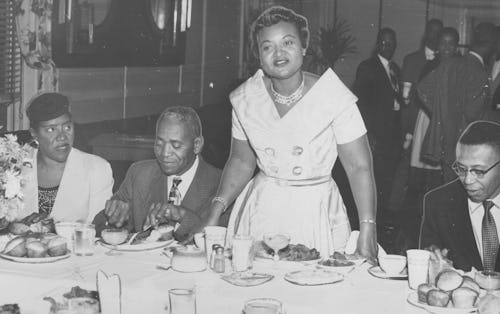Emmett Till's mother was more than her grief — she was a world changer
ABC’s Women of the Movement series will tell the story of the mother of the Civil Rights Movement

On January 6, 2022 one of the most impactful and least discussed legacies of a Civil Rights trailblazer will be on ABC for the world to see. That date is the premiere of the first part of ABC’s six-part series Women of the Movement, which chronicles the civil rights journey of Mamie Till-Mobley, the mother of 14-year-old Emmett Till, who was savagely murdered by racist white men in August 1955. For so long, Till-Mobley has been largely remembered as the grieving mother of a son whose grotesque death outraged the nation into change. But, she meant much more to the Civil Rights Movement than giving birth to a child who was taken by the evils of racism.
Losing your only child to barbarianism would justifiably send any mother into seclusion as means of self-preservation, especially during 1955, when lynchings were as prevalent as ever. But the then-33-year-old Till-Mobley saw power in her pain. After viewing her son’s mangled body following his murder — eyes hanging out of his skull, face pulverized beyond recognition, teeth missing — she felt broken, but she decided to fight. In her first act of incalculable courage, the bereaved mother requested an open casket funeral for her son, and invited publications like JET magazine. People around the country had to sit with a visceral reminder of what white men did to an innocent Black child in Mississippi.
Once eyes befell on the brutal reality for Black Americans that rested in that casket, an uprising began — and the Civil Rights Movement was an inevitable consequence.
Figures like Martin Luther King Jr. are typically the iconic leaders of the Civil Rights Movement, but it was Till’s murder that he called “one of the most brutal and inhuman crimes of the twentieth century” in a stirring speech in Montgomery, Alabama a month after the funeral. No more than two months after King’s speech, the Montgomery Improvement Association, which King was president of, staged the 13-month Montgomery Bus Boycott. The boycott was catalyzed by Rosa Parks’s arrest for refusing to give her bus seat to a white woman, but Till-Mobley’s decision had her son’s desecrated body indelibly woven in the minds and hearts of Black people across the country, galvanizing many to say enough is enough.
“When people saw what happened to my son, men stood up who had never stood up before. People became vocal who had never vocalized before," Till-Mobley said in PBS’s The Murder of Emmett Till.
Beyond being a symbol, she actively fought against injustices around the country until her dying day in January 2003. Shortly after an all-white jury in Mississippi acquitted Till’s murderers Roy Bryant and J. W. Milam, Till-Mobley toured around the country with the National Association for the Advancement of Colored People (NAACP) telling her story in speeches and awakening Black people to their political agency. She considered her own political awakening the “death of innocence” in Death of Innocence: The Story of the Hate Crime That Changed America, a book she co-authored with writer Christopher Benson in 2000. Her speaking engagements with the NAACP are credited with helping NAACP membership skyrocket, showing again how her selfless transparency helped people find their way to change.
Mamie Till-Mobley was more than Emmett Till’s mother. She was a catalyst for arguably the most culturally transformative movement in modern American history, a public school teacher who advocated for equal educational opportunities for Black children, and a woman whose story didn’t begin or end with the death of her son.
And it’s a story we all should make sure to know.